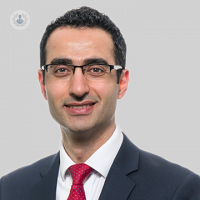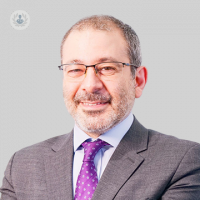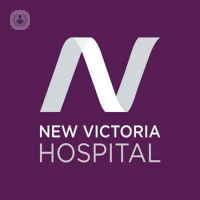What is diarrhoea?
Diarrhoea is characterised by a greater fluidity and volume of bowel movements. These stools can sometimes contain blood, mucus, pus, and undigested food.
When diarrhoea lasts for many days, it can be a sign of a more serious problem. Chronic diarrhoea that lasts for at least four weeks can be a symptom of a chronic disease.
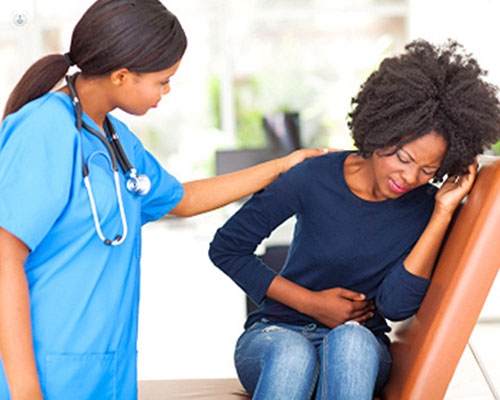
What symptoms does it present?
The main symptoms of diarrhoea, in addition to greater fluidity and volume of the stools, are:
- cramps or pain in the abdomen
- urgent need to go to the bathroom
- loss of bowel control
If the cause of the diarrhoea is due to a virus or bacteria, other symptoms such as fever, chills, and blood in the stool may appear.
In addition, diarrhoea can cause dehydration.
Causes of diarrhoea
The most common causes of diarrhoea are:
- Contaminated food or water
- Viruses, such as the flu
- Parasites
- Certain medications such as antibiotics, anti-cancer drugs, or antacids that contain magnesium
- Diseases of the stomach, the small intestine or the colon, such as Crohn's disease
- Irritable bowel syndrome
- Intolerance or sensitivity to certain foods, such as lactose intolerance
Sometimes, a specific cause is not found. If the diarrhoea disappears after a couple of days it is generally not necessary to investigate further.
Can it be prevented?
Two types of diarrhoea can be prevented: rotavirus diarrhoea and traveller’s diarrhoea.
There are vaccines available for rotavirus.
As for traveller’s diarrhoea, it is important that when travelling, we are careful with the food and beverages we consume in certain countries or in certain regions. Speak to your doctor before going on holiday for advice on avoiding traveller’s diarrhoea. It can help to avoid eating raw fruits and vegetables, and to only drink bottled water.
What is the treatment?
The main objective of the treatment for diarrhoea is to replenish fluids and electrolytes lost due to dehydration. Depending on the cause, your GP or specialist may prescribe a pharmacological treatment to either stop the diarrhoea or treat the infection.
11-13-2012 09-21-2023Diarrhoea
Dr Patrick Wilson - Gastroenterology
Created on: 11-13-2012
Updated on: 09-21-2023
Edited by: Carlota Pano
What is diarrhoea?
Diarrhoea is characterised by a greater fluidity and volume of bowel movements. These stools can sometimes contain blood, mucus, pus, and undigested food.
When diarrhoea lasts for many days, it can be a sign of a more serious problem. Chronic diarrhoea that lasts for at least four weeks can be a symptom of a chronic disease.

What symptoms does it present?
The main symptoms of diarrhoea, in addition to greater fluidity and volume of the stools, are:
- cramps or pain in the abdomen
- urgent need to go to the bathroom
- loss of bowel control
If the cause of the diarrhoea is due to a virus or bacteria, other symptoms such as fever, chills, and blood in the stool may appear.
In addition, diarrhoea can cause dehydration.
Causes of diarrhoea
The most common causes of diarrhoea are:
- Contaminated food or water
- Viruses, such as the flu
- Parasites
- Certain medications such as antibiotics, anti-cancer drugs, or antacids that contain magnesium
- Diseases of the stomach, the small intestine or the colon, such as Crohn's disease
- Irritable bowel syndrome
- Intolerance or sensitivity to certain foods, such as lactose intolerance
Sometimes, a specific cause is not found. If the diarrhoea disappears after a couple of days it is generally not necessary to investigate further.
Can it be prevented?
Two types of diarrhoea can be prevented: rotavirus diarrhoea and traveller’s diarrhoea.
There are vaccines available for rotavirus.
As for traveller’s diarrhoea, it is important that when travelling, we are careful with the food and beverages we consume in certain countries or in certain regions. Speak to your doctor before going on holiday for advice on avoiding traveller’s diarrhoea. It can help to avoid eating raw fruits and vegetables, and to only drink bottled water.
What is the treatment?
The main objective of the treatment for diarrhoea is to replenish fluids and electrolytes lost due to dehydration. Depending on the cause, your GP or specialist may prescribe a pharmacological treatment to either stop the diarrhoea or treat the infection.


Chronic diarrhoea in children: underlying causes and when to get medical help
By Dr Assad Butt
2024-11-21
Persistent diarrhoea in children can be the sign of an underlying condition or it may be a temporary stage of the developing digestive system. Dr Assad Butt provides you with an in-depth understanding of the many potential causes of your child's chronic diarrhoea and clarifies when to get medical help. See more
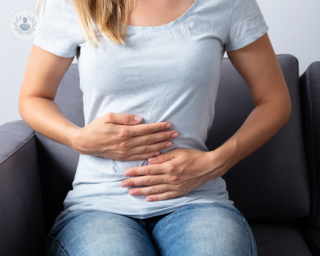

When abdominal pain is serious and when it's not
By Dr Andrew Millar
2024-11-21
Most stomach aches aren't serious and will typically go away in a few days. However, there are certain symptoms that indicate it could be more serious and time to make a trip to see your doctor. Dr Andrew Millar, one of our top gastroenterologists, explains more. See more


Dealing with Delhi belly: diarrhoea in the returning traveller
By Professor Stuart Bloom
2024-11-21
Having a gippy tummy is a common thing to experience when travelling. The question is: what causes travellers’ diarrhoea? Top London gastroenterologist Dr Stuart Bloom has all the answers. See more


Bottoms up! Learn about anal fissures
By Mrs Katie Yeadon
2024-11-21
Anal fissures are relatively common and cause significant discomfort. In this informative article, leading consultant surgeon Mrs Katie Cross expertly explains what causes anal fissures and how they are treated. See more
Experts in Diarrhoea
-
Dr Olga Kapellou
PaediatricsExpert in:
- Neonatology
- Newborn physical examination
- Constipation
- Diarrhoea
- Rashes
- Breathing problems
-
Dr Assad Butt
Paediatric gastroenterologyExpert in:
- Inflammatory bowel disease (IBD)
- Acid reflux
- Abdominal pain
- Food intolerance
- Diarrhoea
- Irritable bowel syndrome (IBS)
-
Dr Mani Naghibi
GastroenterologyExpert in:
- Acid reflux
- Abdominal pain
- Diarrhoea
- Constipation
- Irritable bowel syndrome (IBS)
- Helicobacter pylori
-
Dr Alberto Murino
GastroenterologyExpert in:
- Endoscopy
- Colonoscopy
- Gastroscopy
- Acid reflux
- Abdominal pain
- Diarrhoea
-
Dr Rami Sweis
GastroenterologyExpert in:
- Difficult Swallowing (Dysphagia)
- Gastrointestinal endoscopy
- Constipation
- Diarrhoea
- Barrett's oesophagus
- Achalasia
- See all

Goring Hall Hospital - part of Circle Health Group
Goring Hall Hospital - part of Circle Health Group
Bodiam Ave, Goring-by-Sea, Worthing BN12 5AT
No existe teléfono en el centro.
By using the telephone number provided by TOP DOCTORS, you automatically agree to let us use your phone number for statistical and commercial purposes. For further information, read our Privacy Policy
Top Doctors

New Victoria Hospital
New Victoria Hospital
184 Coombe Lane West, Kingston upon Thames, KT2 7EG
No existe teléfono en el centro.
By using the telephone number provided by TOP DOCTORS, you automatically agree to let us use your phone number for statistical and commercial purposes. For further information, read our Privacy Policy
Top Doctors

The Princess Grace Hospital - part of HCA Healthcare
The Princess Grace Hospital - part of HCA Healthcare
The Princess Grace Hospital, 42-52 Nottingham Pl, W1U 5NY
No existe teléfono en el centro.
By using the telephone number provided by TOP DOCTORS, you automatically agree to let us use your phone number for statistical and commercial purposes. For further information, read our Privacy Policy
Top Doctors
-
Goring Hall Hospital - part of Circle Health Group
Bodiam Ave, Goring-by-Sea, Worthing BN12 5AT, Goring-by-SeaExpert in:
- Hip
- Cataracts
- Gallbladder surgery
- General Surgery
- Orthopaedic surgery
- Hernia
-
New Victoria Hospital
184 Coombe Lane West, Kingston upon Thames, KT2 7EG, South LondonExpert in:
- Cardiology
- General Surgery
- Orthopaedic surgery
- Breast augmentation
- Pain management
- Spine
-
The Princess Grace Hospital - part of HCA Healthcare
The Princess Grace Hospital, 42-52 Nottingham Pl, W1U 5NY, Central LondonExpert in:
- Cancer
- General Surgery
- Orthopaedic surgery
- Robotic Surgery
- Intensive care
- Sports Medicine
- See all
- Most viewed diseases, medical tests, and treatments
- Migraine
- Paediatric rheumatology
- Autoimmune diseases
- Joint pain
- Child nutrition
- Nutrition
- Weight loss injections
- Nipple discharge
- Abdominal pain
- Endovenous laser treatment (EVLA)



